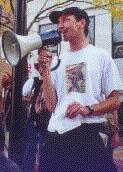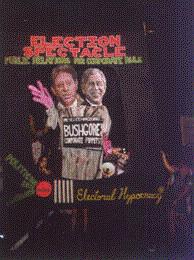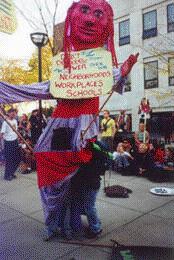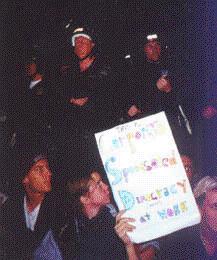Debating the Debates: Boston Organizers Look for Different Way to Challenge System
by John Tarleton
October 2000
BOSTON—Pepper spray. Billy clubs. Phalanxes of robot-like riot police. Thousands of determined protesters drumming and chanting and pressing against the barricades that the powerful throw up to keep dissenting voices at bay. Impromptu street blockades. Dozens of arrests. Mounted police driving their horses into frightened crowds.
The scene outside this year's first presidential debate was a familiar one to anybody who has witnessed the wave of anti-corporate protests that began last November in Seattle. However, not all the radicals were at the barricades in Boston.
"Seattle Should Not Be a Cookie Cutter"
David Solnit, 36, was a co-founder of the Direct Action Network (DAN) and a key organizer of the Seattle protests that put the World Trade Organization (WTO) on tumble dry and threw its proposed "millennium round" of trade negotiations into disarray. He was also at protests in Washington, D.C.(IMF/World Bank), Windsor, Ontario (OAS-Organization of American States) and Los Angeles (Democratic National Convention).
 He arrived in Boston with Freedom Rising, a traveling affinity group of savvy young organizers that specializes in everything from puppets to press conferences. The goal this time was not to shut down the debate but to expand it with open-air discussions in the streets.
He arrived in Boston with Freedom Rising, a traveling affinity group of savvy young organizers that specializes in everything from puppets to press conferences. The goal this time was not to shut down the debate but to expand it with open-air discussions in the streets.
"I don't think doing the same thing every time we confront power is a good idea. Seattle should not be a cookie cutter," Solnit said. "Sometimes, modeling an alternative is the most radical thing we can do to challenge power."
Roxbury
On October 3 (O3), protests swirled around the UMass-Boston campus where the first of three presidential debates was held between Al Gore and George Bush, Jr.. While supporters of Gore (bussed in by the Massachusets AFL-CIO) and Green Party candidate Ralph Nader gathered (and occasionally clashed) near the tightly guarded campus, another group of protesters assembled in Roxbury, a predominantly African-American neighborhood, for a raucous anti-death penalty march.
 A crowd of about 1,000 marched, chanted, sang and drummed beneath a flock of winged cardboard birds, grotesque capitalist monsters, a 12 ft. high cardboard televison set and a giant, two-headed Bush/Gore puppet. It was street carnival and a political rally all rolled into one.
A crowd of about 1,000 marched, chanted, sang and drummed beneath a flock of winged cardboard birds, grotesque capitalist monsters, a 12 ft. high cardboard televison set and a giant, two-headed Bush/Gore puppet. It was street carnival and a political rally all rolled into one.
"This is the best time I've ever had in Boston," said Dustmite, who grew up in the city during the mid-1970s bussing crisis before moving to the West Coast.
For Khalida Smalls, a 23-year-old single mom who works as a coordinator for the Metropolitan Transit Riders' Association, it was a glimpse into a vanished past. "It's a different way of getting the message out," Smalls said. "It feels kind of community like, kinda tribal. It doesn't feel like October 2000 but 1600 something."
"Talking Circles"
The march wound up on Morrissey Avenue, a half-mile from the police barricades. Traffic was already blocked off and the street became an open-air theatre. Speeches were made. The Radical Cheerleaders revved up the crowd. And, the puppetistas put on a skit in front of the cardboard television set.
A couple dozen hapless men and women gradually abandoned their Rousseau-like state of nature to vote for politicians, work for bosses and pay rent to landlords. Then, as rents were skyrocketing, one of the downtrodden had a moment of inspiration. What if they organized as a community, ran off the landlord and turned their buildings into squats? Soon, to the applause of the crowd, the landlord (and the police who protected him) were chased off. Victory. Matthew Borus of the Class Acts puppet troupe then asked people what they would do if they didn't have to give up their time and money to a wealthy elite.
"Make art!" Someone called out.
"Have more sex!" Said another.
After some celebratory dancing and drumming, those who remained (about 150 people) selected facilitators and began talking among themselves about four questions. *How do we reclaim our political power? *What are the problems in our communities that we feel powerless to fix? *What are the obstacles preventing us from fixing those problems *What steps can we take to begin fixing them?
It was a warm autumn evening and people fell into quiet, passionate discussions about everything from mass transit to militarism to micro-radio, organic gardening, redesigning urban spaces, the growing inequalities between haves and have-nots, the criminal (in)justice system, patriarchy and the importance of remaining spiritually grounded. All the world's problems could not be solved in a night. But, people were reclaiming the skills for sitting down together and talking intelligently about serious issues.
"You all are on the cutting edge of something that is going to sweep the nation," said Mariba Jos, a longtime Boston activist who observed the street debates. "I consider these talking circles to be absolutely vital for us to actually live democracy and get from where we are to where we want to be. There's no way we can change the problem that too few people have too much power over too many of us until each person has a voice."
A Vague but Tantalizing Vision
Leone ("Lee-awe-nee") Reinbold, who majored in Social Movements and Political Economy at Evergreen College in Olympia, WA. and spent her senior year working as a full-time organizer for the WTO and IMF/World Bank protests, had no regrets about missing the televised debate that 46 million Americans watched.
 "I don't think the debate that happened inside was in anyway relevant to the lives of the people outside," said Reinbold, who now organizes with Freedom Rising. "The race for president is a popularity contest that doesn't have anything to do with the real issues in peoples' lives."
"I don't think the debate that happened inside was in anyway relevant to the lives of the people outside," said Reinbold, who now organizes with Freedom Rising. "The race for president is a popularity contest that doesn't have anything to do with the real issues in peoples' lives."
Reinbold is a member of the largest electoral bloc in the country: non-voters. She questions how voting one day every two or four years for pre-selected corporate candidates (or even a reformer like Ralph Nader) gives people real power as citizens. Real empowerment, she says, comes from the bottom-up when people begin democratically organizing themselves where they live, work and go to school. Drawing on the writings of social ecologists like Murray Bookchin, she calls for "direct democracy", a vague but tantalizing vision.
The anti-corporate movement that erupted in Seattle and which has continued with large scale mass actions in Washington, Windsor, Millau, Melbourne, Los Angeles, Philadelphia and Prague, is rooted in anarchist principles of decentralization and mutual aid. Contrary to widely televised images, only a small percentage of anarchists choose to engage in property destruction.
Leadership is based on coordination not command. No one can arbitrarily impose their orders on another. Affinity groups of 5-20 people make decisions by consensus and appoint a "spoke" (who can be recalled at any time) to represent them in cluster group meetings which in turn send an empowered spoke to a general "spokescouncil" where decisions, again, are made by consensus. It is a fluid and chaotic process. And it has worked brilliantly, energizing a new generation of activists along the way.
Some of them, like Reinbold, are asking how this model could take root in the communities that people return to when the protests end. What if self-organizing, autonomous yet highly interconnected networks of citizens simultaneously began to form themselves like this in their communities, bio-regions, countries and (taking a cue from the Internet) around the world? It's already happening. And, Reinbold would like to see the process accelerate.
"We're creating a language in which people can talk to each other," Reinbold said. "The hardest battle isn't against the power structure but within ourselves and our communities to function in a cooperative way as political units."
A Subterranean Current
Anarchism, from the Greek words "an" (without) and "archos" (rulers), can trace its philosophical roots as far back as the 5th Century Chinese sage Lao Tze ("If you want to lead the people, follow them"…"Throw away morality and justice and people will do the right thing. Throw away industry and profit and there won't be any theives.") It opposes both the State and private ownership of the means of production as being exploitative.
In the ideal anarchist scenario, the relationship between the individual and the whole would be the same as that between the healthy cell and the body. One, in which the cell maintains its individual autonomy while at the same time being dependant on and contributing to the well being of the larger organism. Optimal cellular function equaling optimal function of the whole, and vice versa.
Early Christian sects practiced anarchism. So too the medieval Waldensians and the 16th Century Anabaptists (aka, the Diggers). Many of the world's indigenous cultures—from the Arawaks who first greeted Columbus to the Eastern Woodlands Indians of North America to the Pygmies of Central Africa to the Aborigines of Australia—were stateless and had no conception of private property at the time of their encounters with European colonizers. In the latter part of the 19th century and the first decades of the 20th, anarchism flourished alongside socialism as a possible alternative to capitalism. A subterranean current that periodically bubbles to the surface, it also re-emerged in Spain '36, France '68 and Chiapas '94.
With the fall of the Berlin Wall, the advent of the Internet (itself highly decentralized thanks to its developers at the Pentagon) and the recent spate of high profile demonstrations, anarchism unexpectedly finds itself with the wind once again at its sails. Just maybe, it offers a glimpse of the future as well as the past. And while anarchists are highly critical of capitalism, they are equally wary of traditional, Soviet-style solutions.
"Marxist-Leninist and authoritarian traditions don't offer any more hope than liberalism because they don't challenge top-down structures," Solnit said. "We just concluded 80 years in which a system calling itself socialism and communism oppressed millions of people and left behind incredible ecological damage. We need to start thinking why that happened and what kind of other alternatives there are."
Standoff
As many as 9,000 protesters (according to the Associated Press) were on hand for the October 3 presidential debate. Nader was turned away and twice threatened with arrest for trying to enter the campus with a valid ticket (courtesy of a local student) and then with a valid press pass (courtesy of Fox News). He departed vowing to file a lawsuit against the privately controlled Commission on Presidential Debates. Many of his supporters didn't leave nearly as quietly.
 Near the end of the debate, hundreds of people chanting "What do we want? Democracy! When do we want it? Now!" surged through the barricades and blockaded a couple of exit streets. They were going to make their stand.
Near the end of the debate, hundreds of people chanting "What do we want? Democracy! When do we want it? Now!" surged through the barricades and blockaded a couple of exit streets. They were going to make their stand.
UMass-Boston is located on a peninsula. The presidential candidates' motorcades managed to slip away. However, charter busses filled with dignitaries were held up for an hour while still-defiant protesters were clubbed, horsewhipped and pepper sprayed. There were 33 arrests. And, a 27-year-old police horse died of a heart attack later that night after his mount repeatedly (and unsuccessfully) urged him to trample on seated protesters.
Next Stop: Winston-Salem, North Carolina
The six members of Freedom Rising plus some local activists from BOOM! (Bostonians Organizing for the October Mobilization!) met several nights later at a puppet making shop to review what went wrong at their action (lots of friction with some of the other groups in the Roxbury March), what went right (hey, the open air debates actually happened) and what to do better (more community outreach) in the future. Soon, they were making plans for doing Election Day (N7) street theatre in Boston.
Meanwhile, Solnit, who supports himself by doing carpentry work, was putting the final touches on the bright red face of another larger-than-life paper mache puppet. His dented blue pickup truck was packed with street theatre supplies. Next stop: Winston-Salem, North Carolina. He and Elliott Caldwell, another member of Freedom Rising, had been invited by "O11" organizers in North Carolina to help with street theatre outside the second presidential debate. For them, it was another small step forward in making revolutionary, non-violent social change from below.
"I'm still committed to shutting down bad institutions at strategic moments," Solnit said. "I'm in favor of using all the direct action tools at different times and someday shutting down the whole system so we can replace it with something better."
Note: John Tarleton helped coordinate media outreach for the O3 Mobilization.
Back to On the Road with John Tarleton